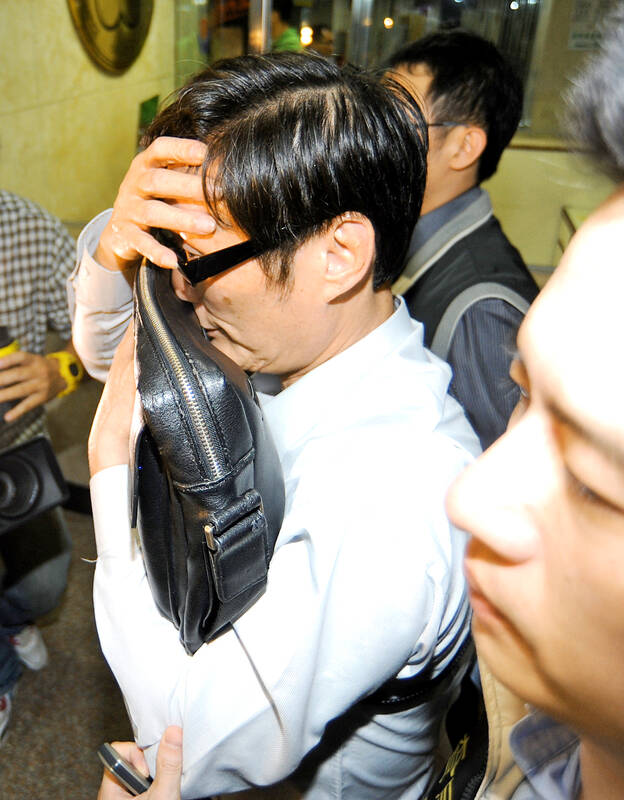A fugitive who had been in hiding for nine years and wanted for defrauding investors by claiming to have developed “magnetic motor vehicle” was arrested earlier this month after being stopped by police for jaywalking, the Taipei police said yesterday.
In 2015, Hsieh Chun-chuan (謝均權), 65, was sentenced to four years in prison for defrauding investors of NT$200 million (US$6.23 million at the current exchange rate), but he jumped bail and disappeared.
Two police officers from Taipei’s Wenshan District Second Precinct said they arrested Hsieh by chance while on traffic duty when they stopped him to issue a ticket for jaywalking.

Photo: Lo Pei-de, Taipei Times
In 2011, Hsieh claimed that his company Ching Hua International Energy Co acquired magnetic technology that could power cars without gasoline or electricity.
He registered several shell companies and solicited investments of NT$100,000 per member, with several thousand people investing.
He promised that each investor would receive a monthly dividend of NT$7,000, totaling NT$168,000 over two years.
However, it turned out to be a Ponzi scheme.
In November 2012, Hsieh was convicted of fraud and breaches of the Business Entity Accounting Act (商業會計法) and the Banking Act (銀行法), and handed a four-year sentence by the High Court.
After failing in his appeal, public prosecutors served notice for Hsieh to serve his four-year prison sentence in January 2015.
However, he jumped bail and remained in hiding, using a forged driver’s license that enabled him to get through police checks in the past.
However, Wenshan police officer Ching Wei-chieh (景暐傑) searched the police database and found that the name of the person on Hsieh’s ID had died, and Hsieh’s appearence did not match the picture on the ID.
After questioning, Hsieh eventually revealed his real name and was arrested for his involvement in the fraud case.

The Coast Guard Administration (CGA) yesterday said it had deployed patrol vessels to expel a China Coast Guard ship and a Chinese fishing boat near Pratas Island (Dongsha Island, 東沙群島) in the South China Sea. The China Coast Guard vessel was 28 nautical miles (52km) northeast of Pratas at 6:15am on Thursday, approaching the island’s restricted waters, which extend 24 nautical miles from its shoreline, the CGA’s Dongsha-Nansha Branch said in a statement. The Tainan, a 2,000-tonne cutter, was deployed by the CGA to shadow the Chinese ship, which left the area at 2:39pm on Friday, the statement said. At 6:31pm on Friday,

The Chinese People’s Liberation Army Navy’s (PLAN) third aircraft carrier, the Fujian, would pose a steep challenge to Taiwan’s ability to defend itself against a full-scale invasion, a defense expert said yesterday. Institute of National Defense and Security Research analyst Chieh Chung (揭仲) made the comment hours after the PLAN confirmed the carrier recently passed through the Taiwan Strait to conduct “scientific research tests and training missions” in the South China Sea. China has two carriers in operation — the Liaoning and the Shandong — with the Fujian undergoing sea trials. Although the PLAN needs time to train the Fujian’s air wing and

Taiwanese celebrities Hank Chen (陳漢典) and Lulu Huang (黃路梓茵) announced yesterday that they are planning to marry. Huang announced and posted photos of their engagement to her social media pages yesterday morning, joking that the pair were not just doing marketing for a new show, but “really getting married.” “We’ve decided to spend all of our future happy and hilarious moments together,” she wrote. The announcement, which was later confirmed by the talent agency they share, appeared to come as a surprise even to those around them, with veteran TV host Jacky Wu (吳宗憲) saying he was “totally taken aback” by the news. Huang,

The American Institute in Taiwan (AIT) put Taiwan in danger, Ma Ying-jeou Foundation director Hsiao Hsu-tsen (蕭旭岑) said yesterday, hours after the de facto US embassy said that Beijing had misinterpreted World War II-era documents to isolate Taiwan. The AIT’s comments harmed the Republic of China’s (ROC) national interests and contradicted a part of the “six assurances” stipulating that the US would not change its official position on Taiwan’s sovereignty, Hsiao said. The “six assurances,” which were given by then-US president Ronald Reagan to Taiwan in 1982, say that Washington would not set a date for ending arm sales to Taiwan, consult